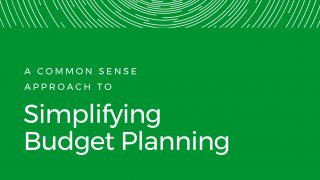- November 8, 2021
- CINC Systems

The conversation around mental health has picked up a lot lately. In the aftermath of a global pandemic, with long stretches of near-isolation and a new norm of remote work, many are facing a lot of challenges with their mental health.
The community association management industry is being hit especially hard. Managers aren’t just responsible for the business success of a community; they’re heavily involved with the boards they serve and the residents of those communities, many of whom are dealing with their own mental health struggles. Shouldering that much burden weighs on a person! It’s important to remember to take a step back and care for your own needs, too.
Spotting the Signs of Burnout
When you think about the signs of burnout that you see in others, they can feel a little obvious. Someone who’s irritable or overly tired probably isn’t sleeping enough from the long hours they’re working. Inability to focus or stay committed to a single task can be a sign that someone’s mind is stretched too thin and has too much on their plate. Tasks being missed or delivered late consistently shows that they’re overburdened in their work.
But when it comes to looking inward at ourselves, we’re not so great at seeing where we need help. We wake up tired and grab an extra cup of coffee to get us through the day. We miss a deadline but know it’s because five other emergencies came up that took priority, so it’s okay in the big picture.
Seeing the problems as a whole instead of as individual bumps in the road that can be temporarily fixed with caffeine or focus music is an important first step in seeing the signs of burnout in yourself.
You Feel Like You’re Overly Tired?
It’s safe to say that most of the world is a little burnt out at all times nowadays. That’s probably not the best thing, but we can’t solve the whole problem all at once. All we can do is take inventory of our own struggles. So if you find yourself reaching for more caffeine than normal on a routine basis, or dozing off mid-task, take note of it. Start keeping track of every extra cup of coffee or can of soda you’re having, or when you feel like you can’t keep your eyes open to finish the task at hand. Set boundaries and goals for yourself dictating what acceptable numbers look like so you know when you’re reaching (or have already reached) your limit.
Are You Easily Distracted or Struggling to Stay Focused?
Another reason why tasks don’t get finished is excessive distractedness. Now it’s totally normal to stop what you’re doing and watch your cat bask in a sunray for five or fifty minutes (kidding!) but if you find that you can’t keep a train of thought going long enough to finish a project, it’s worth taking a step back to reevaluate. Make a note of every time your mind has wandered away while you were in the middle of a task, not just the times something shiny or interesting actually took your attention away. The more frequently this happens, the more likely you are in serious need of a mental break.
Are You Having Trouble with Consistent Task Completion?
Putting a project to bed is always satisfying, but sometimes the steps to get there can get a little overwhelming. On our great days, or even on our good days, we can steel ourselves long enough to push through everything that needs to be handled and take care of business. But when your mind is overworked and you’re running on fumes, even the smallest tasks can feel like an uphill battle.
Take a few moments to gauge your current limits. If you find yourself saying, “I’m usually so good at this, I can get this done in five minutes most days, why am I struggling so hard?” You’re probably already burnt out. Being burnt out isn’t just about the physical limitations like exhaustion. Your brain is a muscle and also needs rest and nutrition. The more you put off necessities like adequate sleep or proper eating, the more likely your overload of work will take a harder toll, and the vicious cycle will drive you into the ground.
Confronting and Resolving Burnout
If you take away nothing else from this article – even if you’re just skimming to get the gold nugget of truth so you can switch back over to one of your 1,001 things on your to-do list – remember this: confronting your own burnout is one of the hardest things to do as a human being. It means admitting you have limitations that will impede your ability to deliver the tip-top highest quality of work at every possible moment, and it means admitting you can’t do it all on your own. And that is okay, and that is critical in being the best manager you can possibly be.
We live in a culture that praises and romanticizes “the hustle.” This is the idea that grinding out as many hours of work as you physically can without dying makes you superior or in some way a more successful person.
Don’t fall for it.
Especially as a community manager, the most important thing you can be for your boards, for your company, and for yourself, is healthy. Pushing yourself to and beyond your limitations is admirable once or twice. But when it’s the baseline for how you live your work life, eventually your body will rebel and shut down. Staying well-rested, staying healthy, and being able to consistently show up is the key to success. The grind is not.
So instead of skipping lunch again to check off another item or two on your list, or working three hours past your office hours to wrap up that project you could reasonably finish tomorrow, stop. Take a step back, take a deep breath, and take the break you’re owed. Take a lunch. Actually eat! Something more than a few bites of whatever you ordered so you could say you ate while you worked through the meal. When the office is closed, so are you! Fine, check the email that comes in at 9:55PM on a Friday. But when that feeling of anxiety tells you that you NEED to answer it immediately or all heck will break loose, tell it to shut up. Go to bed. Unless there is a real emergency (the kind that involve emergency services), don’t get sucked back into work mode. Your body deserves the time it needs to be you as a person, not you as a manager.
Something else the hashtag-grind-life crew won’t tell you is this: don’t be afraid to ask for help. There’s this idea that using tools or people that help you excel is taking a shortcut or in some way diminishes your success. But the most important part of your job is providing stellar service to your communities, and finding the tools to make that happen is jut as important as showing up and putting in the work.
Related Reads

Blog
Keeping Calm and Carrying On: Leadership Tips for Turbulent Times
- November 20, 2024

Blog
AI at Bat: What Umpires, Baseball, and Data Security Can Teach Us About AI Risks
- October 28, 2024

Blog
Do I really need a homeowner app when I have a mobile-friendly website?
- October 14, 2024

Blog
Weathering the Storm: How to Adapt to Soaring HOA Insurance Costs
- October 1, 2024

Blog
How Today’s Generative AI Investment Drives Long-Term CAM Success: A Timeline
- September 16, 2024

Blog
A Common Sense Approach to Simplifying Budget Planning Get ready to conquer HOA budget season with this effective strategy
- September 2, 2024
